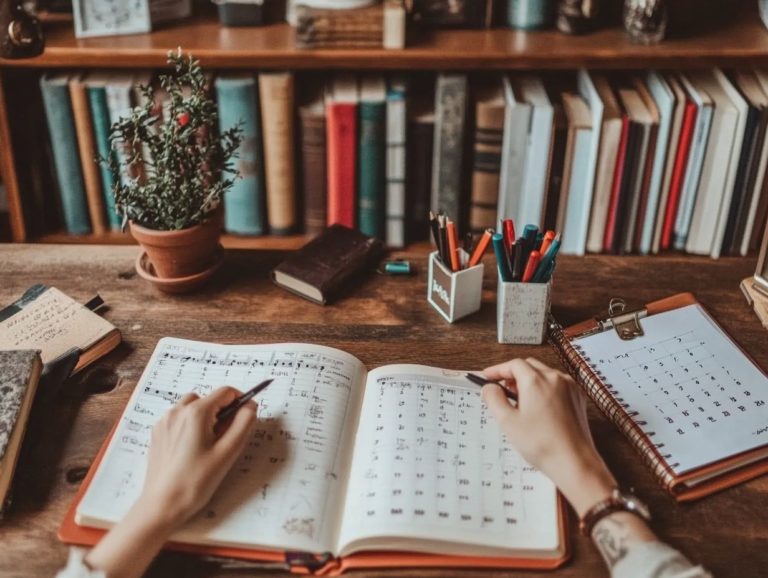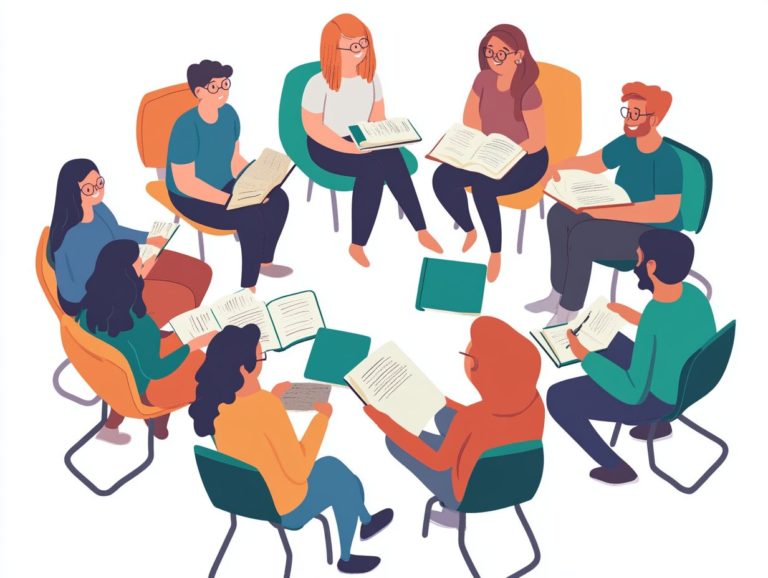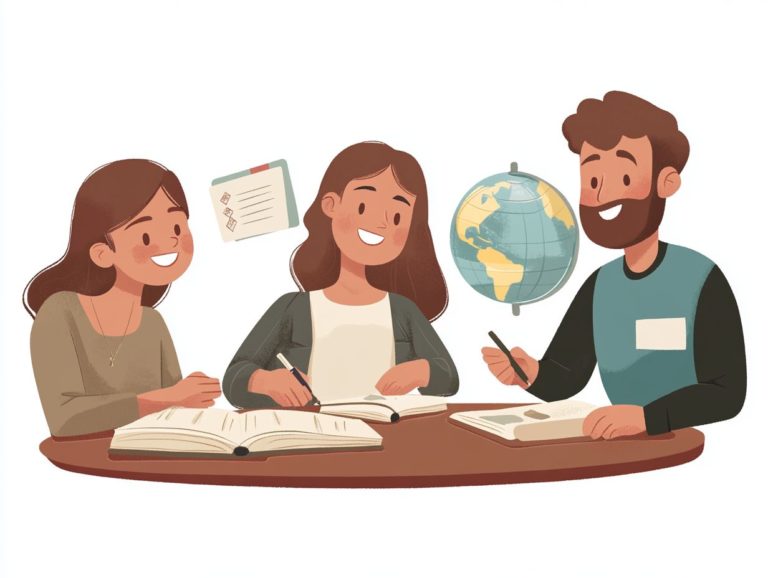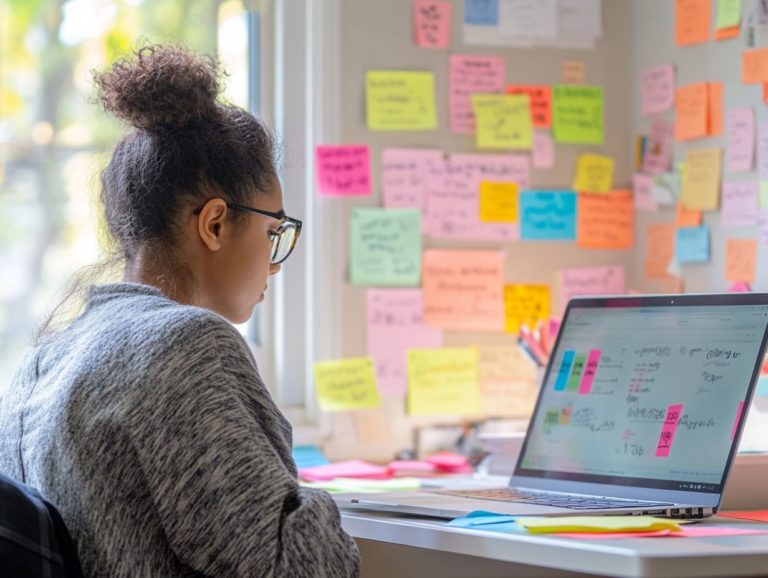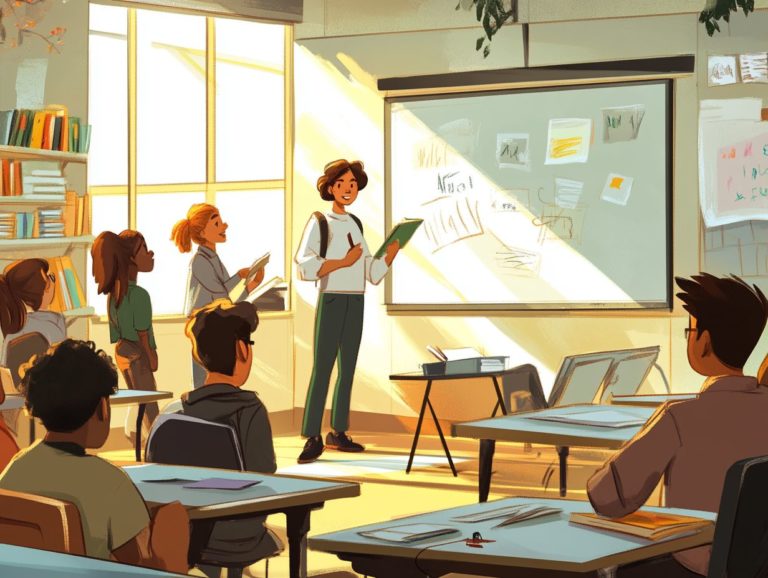The Role of Flashcards in Language Acquisition
Flashcards are an invaluable resource for anyone eager to master a new language. They offer an engaging method to boost memory retention, expand your vocabulary, and understand essential grammar rules.
This exploration delves into the different types of flashcards both traditional and electronic and presents practical strategies for utilizing them effectively.
Get ready to learn how to craft your own personalized flashcard sets and seamlessly incorporate them into your study routine! Along with tips designed to maximize your language acquisition journey, you ll discover how to make studying fun.
Are you prepared to elevate your learning experience? Let s dive in!
Contents
- Key Takeaways:
- The Benefits of Using Flashcards in Language Acquisition
- Different Types of Flashcards
- How to Use Flashcards Effectively
- Tips for Maximizing Language Acquisition with Flashcards
- Frequently Asked Questions
- What Are Flashcards?
- How Do Flashcards Help in Language Acquisition?
- How Can You Get the Most Out of Flashcards?
- Can Flashcards Be Used for All Levels of Language Learners?
- Are There Any Disadvantages to Using Flashcards for Language Acquisition?
- Are There Any Other Benefits to Using Flashcards for Language Acquisition?
Key Takeaways:

Flashcards are powerful tools that make language learning fun and effective! They boost memory retention and improve vocabulary and grammar skills. Both traditional paper and electronic flashcards allow for personalized learning. To use flashcards effectively, personalize them and incorporate them into a regular study routine, utilizing visual aids and practicing active recall.
What are Flashcards?
Flashcards are an incredibly versatile educational tool you can leverage in your language learning journey. They are specifically designed to help you acquire vocabulary and enhance your memory retrieval.
Typically, you’ll find a prompt on one side and an answer or definition on the other. This setup allows you to engage in active recall the process of retrieving information from memory which sharpens your communication skills and deepens your understanding of essential concepts.
Perfect for visual learners, flashcards cater to various styles. This adaptable format supports your cognitive needs by promoting recognition and recall, ensuring you can reinforce your understanding with ease.
Ever wondered how to make your study sessions more fun? Involving family members in your flashcard sessions can significantly boost their effectiveness. Collaborative learning creates a supportive environment, allowing you to transform your study time into enjoyable activities, such as memory matching games or timed challenges, which elevate motivation and engagement.
By integrating real-life scenarios using flashcards for everyday vocabulary, like kitchen items or common phrases you can solidify your language skills in a natural way. Flashcards offer a dynamic and enjoyable approach for learners of all ages, providing a meaningful avenue to enhance your language abilities.
The Benefits of Using Flashcards in Language Acquisition
Enhanced Memory Retention
Flashcards significantly enhance your memory retention by employing active recall. This method encourages you to retrieve information from memory rather than simply reviewing content. It aligns perfectly with cognitive demands, making it an effective strategy for language acquisition, especially for those who thrive on visual learning and benefit from dual coding of information.
Active recall, like testing yourself on flashcards, helps strengthen your memory. For instance, if you’re learning new vocabulary, you might create flashcards featuring a word on one side and its definition or a representative image on the other.
By testing yourself frequently, you not only boost your memorization skills but also forge deeper connections with the material. Flashcards can also be tailored to suit diverse learning styles. If you’re an auditory learner, saying the information out loud may enhance your understanding, while visual learners might incorporate diagrams or colors.
This personalization transforms passive study sessions into engaging cognitive challenges, fostering a more profound and lasting grasp of the material.
Start using flashcards today to unlock your language learning potential!
Improved Vocabulary and Grammar
Flashcards are essential for enhancing your vocabulary and grammar. They serve as an engaging tool to practice and reinforce your language skills.
By incorporating vocabulary flashcards into your study routines, you will expand your word bank while mastering key grammar rules. This ultimately leads to improved communication skills.
In collaborative classroom activities, you can engage in group challenges where students quiz each other using these flashcards. This transforms learning into an interactive and enjoyable experience.
For instance, consider pairing up with a classmate: one of you reads a vocabulary word aloud, and the other must use it in a complete sentence while demonstrating proper grammar.
Group games like ‘Flashcard Bingo’ can spark a competitive spirit and ensure that everyone actively participates in recalling and applying grammar concepts. These methods boost memory and encourage teamwork among peers, enhancing your learning outcomes.
Different Types of Flashcards

You ll encounter two main types of flashcards in educational environments: traditional paper flashcards and electronic flashcards. Each brings its own set of advantages tailored to different learning styles.
Traditional flashcards provide a hands-on experience that many find engaging, and they are easily customizable to suit personal preferences.
On the other hand, electronic flashcards use technology, offering portability and interactive features that can significantly enrich your learning journey.
Traditional Paper Flashcards
Traditional paper flashcards are a timeless educational resource that can significantly enhance your vocabulary learning and reinforce essential concepts in language acquisition. These cards provide a unique opportunity for you to create personalized content tailored to your specific learning objectives, whether you’re a student or a teacher.
The process starts with selecting key terms or concepts that you want to emphasize. From there, you can design engaging visuals and concise definitions for your cards, making them as appealing as they are informative.
In the classroom, you can implement various activities, such as matching games or timed quizzes, to encourage active participation and make learning dynamic.
Using these flashcards makes learning fun for everyone! When you use flashcards in group settings, you can share insights and teaching methods, enriching the overall learning experience while accommodating diverse learning styles.
Ultimately, traditional paper flashcards are powerful tools for reinforcing knowledge and enhancing retention, helping you on your journey to mastering language skills.
Electronic Flashcards
Electronic flashcards have transformed the way you learn vocabulary don t miss out! These digital tools enable you to access flashcards from various devices, promoting flexible learning and deepening your involvement in your educational journey.
By incorporating audio components and visual aids, they cater to your diverse learning styles, ensuring that both auditory and visual learners benefit. Many platforms now come equipped with features that track your progress, pinpointing areas that need a bit more attention and encouraging you to revisit those challenging words.
This targeted approach streamlines your study sessions while nurturing consistent engagement. As you continually review and test your knowledge, you build confidence and elevate your overall academic performance, leading you to a more successful and fulfilling educational experience.
How to Use Flashcards Effectively
To use flashcards effectively, craft personalized cards that resonate with your unique learning style.
Integrating these tailored flashcards into a consistent study routine is key. This systematic approach not only enhances your retention but also deepens your understanding of the language material you re engaging with.
Creating Personalized Flashcards
Creating personalized flashcards tailored to your unique learning style and needs can significantly enhance your vocabulary learning and elevate your communication skills.
By incorporating relevant images, example sentences, and synonyms, you engage with the material in a way that resonates with how you think. Diversifying the mediums you use like adding audio clips or interactive digital formats makes your learning experience more dynamic.
Factoring in your personal interests when selecting vocabulary is also beneficial. This ensures that the content remains relevant and engaging, fostering a deeper connection with the material and boosting your motivation.
When your study tools reflect your unique preferences and goals, you re more likely to retain information and apply it in real-world situations. The more invested you are in your learning process, the more successful you will become in mastering new vocabulary and enhancing your communication skills.
Incorporating Flashcards into Your Study Routine

Incorporating flashcards into your study routine can significantly enhance your language learning outcomes. This approach promotes active recall remembering information without looking it up and spaced repetition, which involves reviewing material at increasing intervals.
To maximize the benefits of flashcard usage, set specific goals for yourself, such as mastering a defined number of new words each week. Integrating flashcards during breaks between study sessions is an effective technique; these short bursts of review help keep the material fresh without overwhelming you.
Collaborating with a study partner can deepen your comprehension. Discussing and quizzing each other with flashcards reinforces retention through valuable peer interaction.
Establishing a consistent study schedule is crucial. This not only fosters discipline but also ensures that your knowledge builds progressively for optimal mastery.
Tips for Maximizing Language Acquisition with Flashcards
To truly maximize your language acquisition with flashcards, incorporate visual aids and practice active recall. These strategies can significantly elevate your learning experience.
These methods engage various learning styles and promote superior retention of vocabulary and grammar. By adopting these techniques, you’ll find your language skills flourishing in no time!
Using Visual Aids
Using visual aids alongside flashcards can significantly enhance your vocabulary learning experience. This approach taps into your visual memory and accommodates various learning styles.
Incorporating images, diagrams, and color coding reinforces the meanings of words and concepts, making the learning journey more engaging. For example, when you include illustrations that depict the meanings of new vocabulary, you enhance comprehension, especially for visual learners.
Employing mind maps or infographics provides a comprehensive overview of related concepts. This makes it easier for you to connect ideas and retain information.
Using different colors for various themes or topics creates visual cues that help you recall details during assessments. These techniques cater to diverse learning preferences and foster a more interactive educational environment, ultimately leading to improved academic performance and long-term retention of knowledge.
Practicing Active Recall
Practicing active recall with flashcards is a powerful technique that can elevate your memory retrieval and enhance your learning experience. By engaging with the material, you ll find that you re more likely to remember vocabulary and grammar rules over time, leading to improved language skills.
Take this method a step further with self-testing. Challenge yourself to recall information without peeking at the answers. This not only reinforces your understanding but solidifies your knowledge.
Incorporating spaced repetition into your study routine helps you remember better over time. This means reviewing information at spaced intervals helps your brain retain it longer.
Group study activities create a collaborative environment where you and your peers can quiz each other, share insights, and tackle challenging concepts together. Each of these strategies supports your learning process and aligns with cognitive science research, showing that retrieval practices significantly enhance long-term memory retention.
Frequently Asked Questions
What Are Flashcards?

Flashcards are a fun and exciting tool that supercharge your language learning! They consist of cards with information or pictures designed to help with memorization and understanding of a particular subject or topic.
How Do Flashcards Help in Language Acquisition?
Flashcards provide visual cues and prompts for new vocabulary, helping with memorization and recall. They offer a fun and interactive way to practice language skills.
How Can You Get the Most Out of Flashcards?
The most effective way to use flashcards is to review them regularly, incorporate them into different learning activities, and combine them with other language learning methods like speaking and listening practice.
Can Flashcards Be Used for All Levels of Language Learners?
Yes! Flashcards can be used for all levels of language learners, from beginners to advanced speakers. They can be adapted to meet the specific needs and abilities of each learner.
Are There Any Disadvantages to Using Flashcards for Language Acquisition?
While flashcards are helpful, they shouldn’t be the only method used for language acquisition. It’s important to also practice speaking and listening skills and use various resources to learn grammar and sentence structure.
Are There Any Other Benefits to Using Flashcards for Language Acquisition?
Aside from aiding in vocabulary memorization and recall, flashcards can improve visual and spatial memory, increase motivation and engagement in learning, and can be easily customized for individual learning needs.

